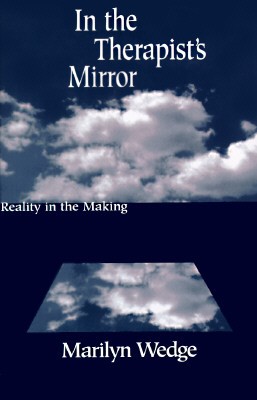| In the Therapists Mirror Contributor(s): Wedge, Marilyn (Author) |
|
 |
ISBN: 0393702359 ISBN-13: 9780393702354 Publisher: W. W. Norton & Company OUR PRICE: $23.75 Product Type: Hardcover Published: September 1996 Annotation: This book integrates the problem-solving focus of strategic family therapy with narrative therapy's emphasis on stories and the cultural context of meaning. It extends the rich and productive tradition of strategic therapy by embracing the importance of symbolic forms in creating and transforming experience. Marilyn Wedge uses engaging case examples to illustrate her central argument, that all experience, even the experience of one's own self, is a construction of signs. Drawing upon the power of symbolic forms to create meaning, she introduces a new theoretical position of semiotic constructivism. While symbols have long been a part of psychotherapy, the roles of such symbolic forms as myth, ritual, and polysemic or multivocal language in constructing meaning in therapy need to be reinterpreted in light of the postmodern era. This integration of strategic and narrative in the symbolic is laid out in the first half of the book. In the therapist's mirror the symbol becomes a structuring metaphor. It is the place where the therapist and client meet, where the jumble of life becomes meaningful, and where a strategic move has power. Here reality is made, and transformed, in the experience of our lives. |
| Additional Information |
| BISAC Categories: - Psychology | Psychotherapy - Couples & Family - Social Science - Psychology | Psychopathology - Compulsive Behavior |
| Dewey: 616.891 |
| LCCN: 96008687 |
| Series: Norton Professional Books (Hardcover) |
| Physical Information: 0.83" H x 5.85" W x 8.55" (0.85 lbs) 172 pages |
| Descriptions, Reviews, Etc. |
| Publisher Description: Integrating strategic problem-solving, and emphasis on stories and the cultural context of meaning, this book introduces the theoretical stance of semiotic constructivism. Its main argument, illustrated in engaging cases, is that all experience is a construction of signs, and that symbolic forms such as language, myth, ritual and drama create and shape our realities, and provide useful tools for encouraging therapeutic change. |
Contributor Bio(s): Wedge, Marilyn: - Marilyn Wedge is a family therapist in private practice for thirty years. She has a PhD from the University of Chicago and writes blogs for the Huffington Post and Psychology Today. She lives in Oak Park, California. |